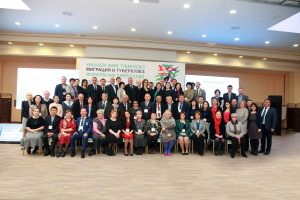Migration and tuberculosis: transboundary TB control and anti-tuberculosis care in the Central Asian region

Issues of transboundary tuberculosis control in Central Asian countries were discussed at the third regional high-level meeting in Astana, in which representatives of Uzbekistan
From 6 to 7 December 2017, the third high-level regional meeting “Migration and Tuberculosis: Transboundary TB Control and TB Care in the Central Asian Region” was held in Astana.
At the event, organized by the Ministry of Health of the Republic of Kazakhstan, Project HOPE, the Global Fund to Fight AIDS, Tuberculosis and Malaria (the Global Fund) and the United States Agency for International Development (USAID), representatives of government agencies, national TB programs and migration authorities Central Asian countries, World Health Organization (WHO) experts, STOP TB Partnership, International Organization for Migration (IOM), International Federation of Red Crescent Societies Resta and Red Crescent Societies, as well as representatives of civil society.
The meeting was organized as part of the implementation of the Comprehensive TB Control Plan in the Republic of Kazakhstan for 2014-2020. and the program “Activities on cross-border control of TB, M / XDR-TB and TB / HIV among labor migrants in the Republic of Kazakhstan”. The first and second meetings of this format were held in November 2015 and December 2016 to develop mechanisms for regional coordination and collaboration on the diagnosis and treatment of tuberculosis.
The purpose of the 3 rd high-level meeting was to discuss the implementation of the Action Plan / Roadmap for the second year and further steps in the implementation of the WHO “Eliminate tuberculosis” strategy.
“The comprehensive plan to combat tuberculosis in the Republic of Kazakhstan for 2014-2020 provides for measures to improve the TB service for migrants and initiate a regional dialogue with neighboring countries of Central Asia on this issue. I want to note that the dialogue takes place on a mutually beneficial basis, with the interest of all parties. The signing of bilateral agreements is important from the point of view of the effectiveness of regional cooperation on transboundary control, prevention and treatment of tuberculosis in the region, “said Laura Ahmetniyazova, director of the Department of Organization of Medical Assistance of the Ministry of Health of the Republic of Kazakhstan.
“Tuberculosis knows no bounds. Migrants are a vulnerable part of the population. A successful solution to the problem requires partnership between countries, “said US Ambassador to the Republic of Kazakhstan George Krol.
“Kazakhstan is one of the countries that pays great attention to the fight against tuberculosis and has become the leader in the region in the transboundary control of this disease. The comprehensive plan to combat tuberculosis in Kazakhstan provides not only activities to improve access to diagnosis and treatment for migrant workers, but also aims at regional dialogue on this issue. Since December 2014, Project HOPE, with the financial support of the GF, has launched a program to support the Comprehensive Plan to Combat Tuberculosis in Kazakhstan. I want to emphasize that with the support of the Ministry of Health and national partners much has already been done. An effective dialogue was established between the countries of the region, and the forthcoming conclusion of bilateral agreements on transboundary tuberculosis control will allow the introduction of long-term mechanisms in the fight against tuberculosis in the region, “said Mariam Sianozova, Senior Regional Director of Project HOPE for Europe and Eurasia.
The plenary sessions of the meeting discussed the progress of the implementation of the Comprehensive Plan of the Republic of Kazakhstan on the component of tuberculosis control among migrants, the next year’s Action Plan, the results of the external evaluation of the Program “Activities on cross-border control of TB, M / XDR-TB and TB / HIV among labor migrants in the Republic of Kazakhstan” and recommendations for the future. The expert consultants commented on the results of the work on transboundary tuberculosis control in the region and suggested their vision for further steps.
At the meetings of the working groups, the issues of improving access to health services for migrants, intersectoral interaction and coordination of actions of state structures of the anti-tuberculosis service and civil society were considered.
The resolution of the meeting summarized the recommendations for further work on transboundary control of tuberculosis.



